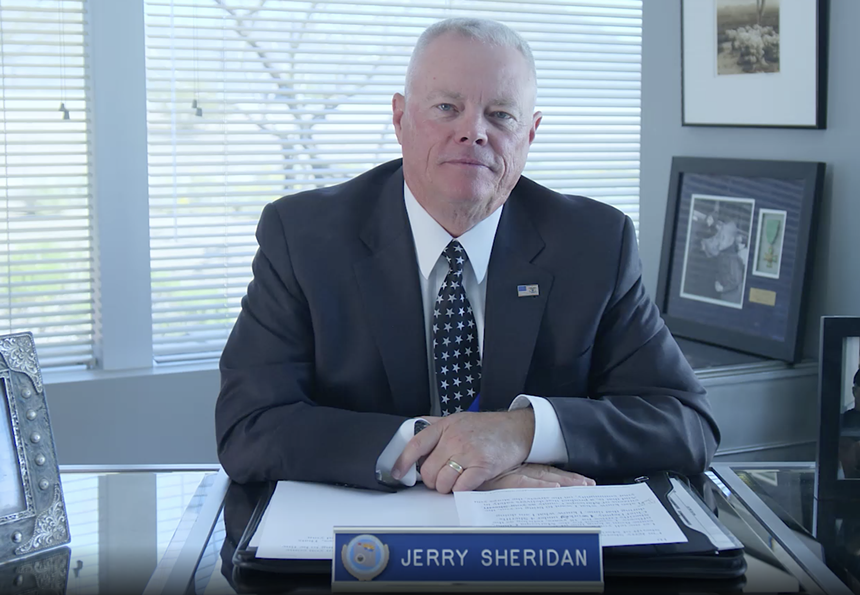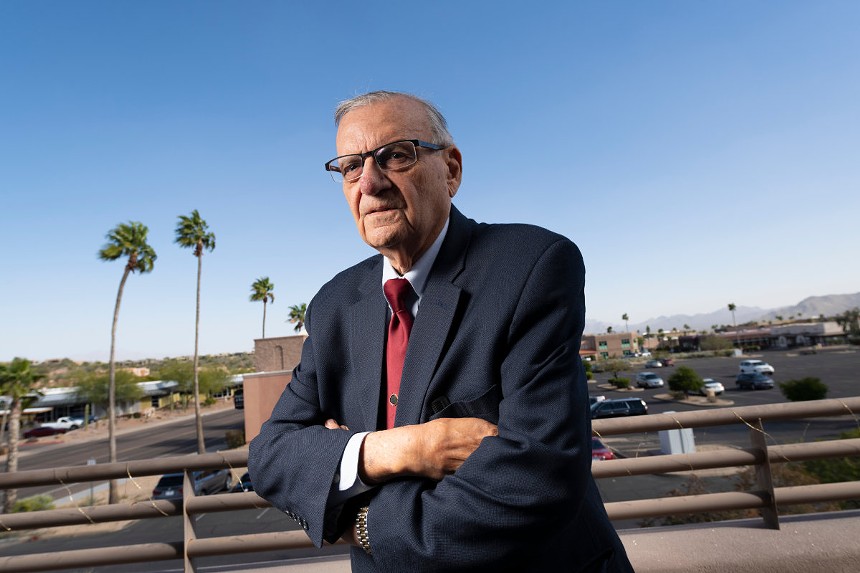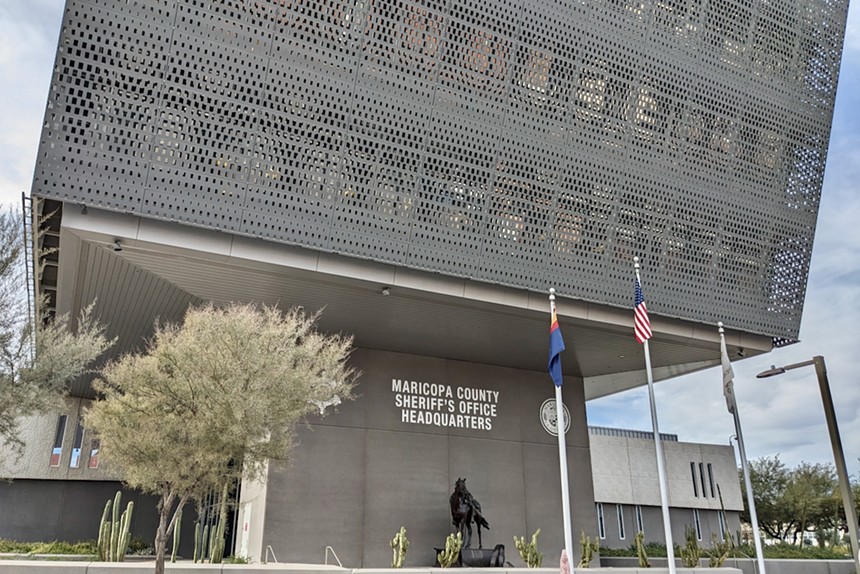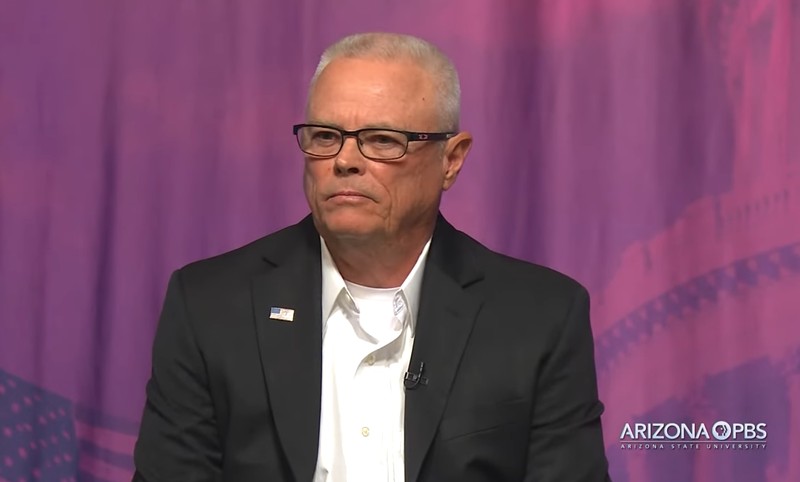The onetime second-in-command to notorious former Maricopa County Sheriff Joe Arpaio is now running for Arpaio’s old job. But in a recent attempt to distance himself from the misdeeds of his former boss, Sheridan wound up rewriting a damning chapter of his own professional history.
The setting was a May 23 debate on PBS between the three Republicans running for Maricopa County sheriff. The subject: the racial profiling lawsuit Melendres vs. Arpaio, which by June 30 will have cost county taxpayers more than a quarter of a billion dollars.
The fib? That Sheridan, who served as Arpaio's chief deputy from 2011 to 2016, had no knowledge of or involvement in the agency's defiance of a court order to stop its enforcement of immigration law during sweeps of Latino neighborhoods. U.S. District Court Judge G. Murray Snow, who issued that order, eventually ruled the sweeps were unconstitutional.
It’s a falsehood Sheridan has attempted to pass off before, resulting in a civil contempt conviction and a spot on the Brady List, a roster of cops with ethical issues kept by the Maricopa County Attorney’s Office.
Unfortunately for Sheridan, it's also a fallacy that is easily debunked.

‘Knowing misstatements’
During the debate, the pertinent exchange began when moderator Ted Simons referred to a videotaped statement by Sheridan from 2013.
Earlier that year, Snow found the sheriff’s office guilty of widespread racial profiling, later appointing a monitor and mandating a laundry list of reforms that the agency is still struggling to implement. In the video mentioned at the debate, Sheridan called Snow’s ruling “crap.”Sheridan clarified at the debate that he actually called the order "ludicrous and crap,” though he now says the sanctions levied by the court were only “over the top.” But then he launched into a rosy depiction of his role in the Melendres suit.
The suit was filed in 2007 in response to Arpaio's sweeps of Latino neighborhoods, during which sheriff's deputies pulled over Latinos under the pretext of minor traffic violations in order to inquire about their immigration status. At the time, Sheridan noted in the debate, he was not Arpaio’s chief deputy but was running the jail system. He also claimed he didn't get involved in the case until Arpaio "sent me to the courtroom the day the judge had issued his order and decision” in 2013.
"In fact,” Sheridan added, “the judge has said in open court that that was the day MCSO began to comply with his order.”
But the implication that Snow approved of Sheridan’s conduct in the case couldn't be further from the truth.
In the run-up to a 2012 trial in the suit, Snow issued a December 2011 preliminary injunction prohibiting the sheriff’s office from enforcing civil immigration law. But for 17 months following his order, Snow later learned, Arpaio’s office continued to stop Latinos on the basis of race and turn over to federal authorities anyone suspected of being in the country illegally. Arpaio even bragged about it, promising in numerous public statements that his office would continue its practices despite Snow’s order.
Sheridan was Arpaio's second in command by then, though he later claimed in a hearing before Snow that he did not know about the 2011 preliminary injunction until nearly three years later. Snow found those assertions erroneous, lambasting both Sheridan and Arpaio in a 2016 ruling for making "multiple intentional misstatements of fact while under oath" and engaging in "multiple acts of misconduct, dishonesty and bad faith."
In that ruling, Snow found Sheridan guilty of two counts of civil contempt. Snow later ordered an independent internal affairs investigation into what the judge called Sheridan's "knowing misstatements" regarding the 2011 preliminary injunction. That probe ended with Sheridan's name being placed on the county attorney's Brady List, which is named after a 1963 U.S. Supreme Court decision that ruled that the government must disclose any potentially exculpatory material to a defendant. This includes any information that undercuts the credibility of a government witness, such as a police officer caught lying.

‘Not credible’
In a lengthy email to Phoenix New Times on Wednesday, Sheridan denied he'd ever distorted the truth. He pointed to a 2015 internal investigation by private investigator Don Vogel that Sheridan contended cleared him of wrongdoing.
"None of the allegations were sustained," Sheridan wrote, adding that the judge "was not happy with the results and ordered a second internal investigation."
Vogel's report did not conclude that Sheridan had been untruthful, but it didn’t exonerate him either. Per the report, Sheridan "failed to have the appropriate oversight and control of information affecting units under his command." Vogel also found that Sheridan received an email about the 2011 preliminary injunction the day it was issued — which Sheridan said he never opened — and that other top brass recalled discussing the order with him.
Sheridan’s best explanation to Vogel in 2015: "I’m not a lawyer. I’m a cop. I didn’t know what a preliminary injunction was."
But the second investigation, conducted in 2016, found what Snow called “overwhelming evidence” to contradict Sheridan’s claim of ignorance. Sheridan was copied on emails from the agency’s attorney about the injunction and attended meetings in which it was discussed, including a meeting of the Maricopa County Board of Supervisors.
“It is not credible,” Snow wrote, "that Chief Deputy Sheridan, as Arpaio’s immediate subordinate in charge of all of the MCSO’s operations, would have been wholly ignorant of a matter of such importance to Arpaio.” Snow also found that Sheridan disobeyed a court order that the sheriff’s office quietly gather traffic stop videos recorded by deputies, hitting Sheridan with a second finding of civil contempt.
In August 2016, Snow found probable cause that Sheridan withheld evidence from the court and sought to conceal other evidence from the judge's monitor, referring the allegations to the U.S. Justice Department, which dropped the case because the statute of limitations had expired.Snow also found Arpaio guilty of three counts of civil contempt in 2016, referring the case to the Justice Department, which prosecuted and convicted Arpaio for criminal contempt of court. President Donald Trump pardoned Arpaio in 2017.

The Brady List
Whether or not Sheridan can convince anyone his hands were clean in the Melendres case, there’s no disputing that he’s the only candidate for sheriff in 2024 with the dubious distinction of being on the county attorney's Brady List.
Many in law enforcement consider a Brady List placement to be a stain on a cop's record. In 2020, the last time Sheridan ran for county sheriff, he also felt that way.During a debate that year between Sheridan and Sheriff Paul Penzone, the incumbent suggested that Sheridan should be on the Brady List because he had "lied in court.” Sheridan, who had beaten Arpaio in that year's Republican primary, took umbrage.
"If I was untruthful, I would be on the Brady List,” Sheridan retorted, “which I am not.”
That was true at the time. But two years later, in 2022, the county attorney’s office added Sheridan’s name to the list, citing the independent investigation Snow ordered in 2016. That investigation recommended dismissal as punishment. If Sheridan had still been with the agency — he left in December 2016 — he could have been fired.
In his email response to New Times, Sheridan claimed his placement on the list was “weaponized for political purposes.” Because he was retired and a civilian at the time, he wrote, adding him to the list was inappropriate. He also said he was not notified when that 2016 investigation was completed, nor was he given the chance to take a polygraph test or otherwise clear his name.
"Considering the seriousness of the allegations, this was a direct violation of my constitutional rights of due process and the Arizona Peace Officers Bill of Rights," he wrote. "I was NEVER untruthful."
Sheridan now seeks to convince voters he's right for the job. That didn't work in 2020, when Penzone handily defeated him in the general election. Penzone resigned in January.
Should Sheridan prevail against Mike Crawford and Frank Milstead in the Republican primary on July 30, he'll face one of two Democratic candidates: incumbent Sheriff Russ Skinner, a former Republican turned Democrat appointed by the Board of Supervisors to serve the remainder of Penzone's term, or former Phoenix police officer Tyler Kamp.
Whether voters believe Sheridan was always truthful remains to be seen. But Snow didn't. In July 2016, according to a report from Courthouse News Service, Snow shared his view in open court.
Arpaio and Sheridan, he said, "lied to my face."











